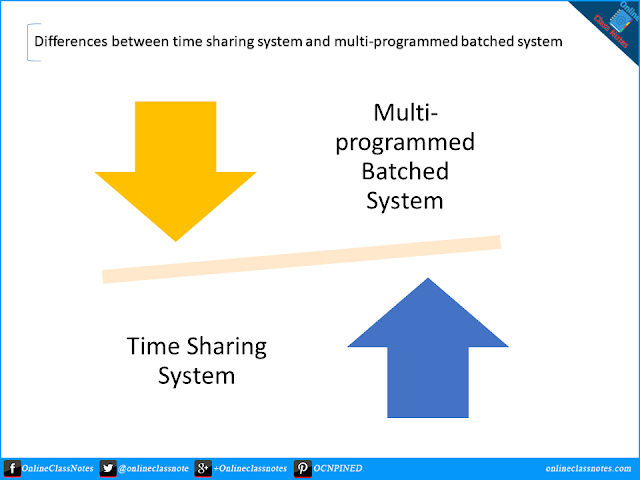Q. What are time sharing and multi-programmed batched systems? What are the differences between time sharing and multi-programmed batched systems?
Time-Sharing Systems:
Time sharing operating systems are extension of multi-programmed batched operating system and the extension is that here the user can interact with the program running. The CPU scheduling algorithm and allocate small amount time to each job at once and then move on to the next job. Thus the user can get output from the program and can input another command and wait for the output. Keyboard is used to input command and monitors are for output. A time sharing operating system allows many user to use the same computer at the same time such as every user is using his own computer. This is achieved by frequently switching from one program to another and satisfying users with an output from the program before switching to the next one.
Multi-programmed Batched Systems:
In multi-programmed batched operating systems, the operating system reads jobs from disk drives where a list of jobs are already being stored through card readers. The operating system then pull and store as much job as it can in the memory. Then from the memory, operating system start working on a job. Now, whenever a job reaches a situation where is has to be waiting for one or more tasks to be completed like use of any IO devices, the operating system pulls another job from the memory and starts working on it. Whenever this job also starts waiting, for example it need to use the same IO which is already in use by its previous job, the operating systems pulls another job. This is how, a multi-programmed batched systems harness the power of disk drives and memory.
2 Differences between time sharing and multi-programmed batched systems:
|
Time Sharing Systems
|
No.
|
Multi-programmed Batched Systems
|
|
This system works for the same or less time on each processes.
|
1
|
This system won’t take same time to work on different processes
|
|
This system depends on time to switch between different processes.
|
2
|
This system depends on devices. That is, it depends on devices to switch between tasks such I/O interrupts etc.
|
|
Example: Windows 95, MacOS etc.
|
3
|
Example: Unix, Linux etc.
|
Read More: Briefly describe different types of operating systems.
